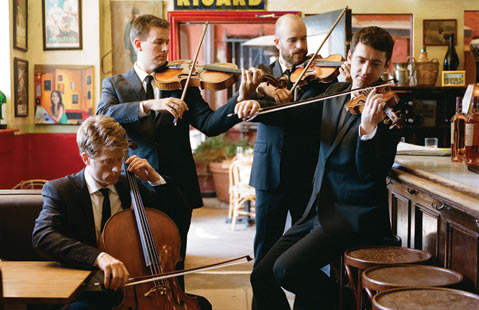Calder Quartet Comes to Hahn Hall
Old and New Combine on Thursday, February 20

Beyond the bold athleticism of the Bill T. Jones/Arnie Zane Dance Co. performance last October, there was one additional wonder that night — the fact that the soundtrack was no soundtrack at all. The evening’s live string players included the Los Angeles–based Calder Quartet, four men who bonded during their time at USC and 15 years hence have charted an impressive and adventurous résumé. By all indications, Calder appears to be the representative quartet for the 21st century; they’re young, flexible, open-minded, deeply dedicated to the tradition, and irresistibly drawn to the new. They have held residencies at top schools like the Colburn Conservatory and Juilliard, recorded with leading pianists Gloria Cheng and Anne-Marie McDermott, and successfully mastered (with the latter) a much-lauded rendition of piano concertos by Mozart, pared down for piano quintet. They secure coveted spots in the global round of music festivals. But at the same time, they are the hot strings heard in the Emmy-winning theme to Starz’s Da Vinci’s Demons, and they show up on late-night TV with rockers like The Airborne Toxic Event. As part of the Up Close & Musical Series, UCSB Arts & Lectures brings the Calder Quartet to Hahn Hall on Thursday, February 20. Read on for our interview with violinist Andrew Bulbrook.
Tell us about Calder’s connection to new music and living composers. Right around the time we were founding the Carlsbad Festival with Matt [McBane], we also started working with Christopher Rouse at Aspen, and it was really an amazing process for us, at 22 or 23 years old, to be working with a living composer with Pulitzer Prizes and Grammys and big artists wanting to premiere his works. Yet still, even in that position, he had time to spend with a young quartet that really wanted to try to master what he had written. And the pieces weren’t being played a lot, because they were extremely difficult; generally, after the premiere, they were shelved because it’s a big undertaking. That whole experience was really powerful for us, to see how much somebody like that could be moved by your efforts as a performer. You don’t have that luxury with Beethoven. But when the composer’s alive, it is a really warm and personal thing.
Like the Terry Riley pieces you recorded, written in the early 1960s. Exactly. You’re thrilled to meet him; then you play these pieces for him, and he’s got tears in his eyes — how powerful it can be and how that process of diligent work can affect another human being.
That reciprocal relationship — it must really affect the musician’s experience. It’s had a huge effect. And it’s motivated us on more traditional repertoire, in terms of finding an authentic voice. You know, you read enough music and then meet the writer, and you sort of learn the imperfection of written music. Someone will have a tempo marking, and you’ll play it for them, and they’ll tell you it’s too fast, when that’s exactly what’s written. They tell you to play it two-thirds as fast, and they don’t bother to change anything in the music for any future performer. And then you talk of your Beethoven metronome markings!
Working with people like Chris [Rouse] — that was a really important part of our development. And the [Thomas] Adès [piece] that’s on the program is a really great example of that. We learned the Arcadiana in 2005 or 2006; then we learned the Piano Quintet four years later. Then Tom started playing the Piano Quintet with us, which was amazing. What better way to understand what’s written on a page than having the composer sitting next to you?
4•1•1
UCSB Arts & Lectures presents the Calder Quartet at the Music Academy of the West’s Hahn Hall (1070 Fairway Rd.) on Thursday, February 20, at 7 p.m. Call (805) 893-3535 or visit artsandlectures.sa.ucsb.edu for tickets and info.



